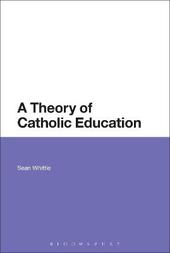
|
A Theory of Catholic Education
Hardback
Main Details
| Title |
A Theory of Catholic Education
|
| Authors and Contributors |
By (author) Sean Whittle
|
| Physical Properties |
| Format:Hardback | | Pages:232 | | Dimensions(mm): Height 234,Width 156 |
|
| Category/Genre | Roman Catholicism and Roman Catholic churches |
|---|
| ISBN/Barcode |
9781472581389
|
| Classifications | Dewey:371.0712 |
|---|
| Audience | | Tertiary Education (US: College) | |
|---|
|
Publishing Details |
| Publisher |
Bloomsbury Publishing PLC
|
| Imprint |
Bloomsbury Academic
|
| Publication Date |
20 November 2014 |
| Publication Country |
United Kingdom
|
Description
Presenting a robust and philosophically based account of education from the Catholic point of view, Sean Whittle engages with important debates and questions concerning the nature and purpose of Catholic education and schooling. The book opens with a review of the criticisms that have emerged about the prevalence of Catholic schools within the state system and, indeed, about the very notion of there being such a thing as 'Catholic education'. The author then goes on to survey official Church teaching on education and the work of key Catholic thinkers, Newman and Maritain, before moving on to discuss the writings of Karl Rahner, a leading twentieth century theologian. A Theory of Catholic Education argues that Rahner's approach, with his focus on the place of mystery in human experience, provides a way forward. Ultimately, Whittle demonstrates how Catholic theology can offer a unique and much needed theory of education.
Author Biography
Sean Whittle is a secondary school teacher of Religious Education and Philosophy with over twenty years' experience working in various Catholic schools in London. He has a PhD in Philosophy of Education from the IOE, UCL's Faculty of Education and Society, University College London, UK.
Reviews[This] is a fluently written, elegantly designed, thought-provoking, critically probing and constructive book. Whittle... offers a rational defence of Catholic education for the 21st century, opens out some strikingly new avenues towards the non-confessional curriculum entailed by his theory of Catholic education, and supplies a much-needed prompt to move debates on this subject forward to a new level. * John Sullivan, Liverpool Hope University and Newman University, UK * This book is important for three reasons. First, Catholic schools (as the book explains) constitute a very large number of schools both world-wide and in the UK. No comprehensive account of education can omit reference to their distinctive contribution to education as a whole. Second, that contribution is increasingly challenged externally by those who see the very nature of faith-based schools to undermine the integrating nature of schooling in diverse and multicultural societies. 'We should be supporting the 'common school''. Third, the nature of that contribution is increasingly challenged from within the Catholic Church as the curriculum and the teaching need to take account of the cultural influences impinging on the lives of its pupils. The book - careful, systematic and well-informed - deals with each of these challenges. It is both philosophically and theologically of high quality. It deserves to be read by all those who govern and teach in Catholic schools, and by those who question their very existence in an increasingly hostile world. * Richard Pring, Emeritus Professor, Department of Education, and Emeritus Fellow of Green Templeton College, University of Oxford, UK. *
|